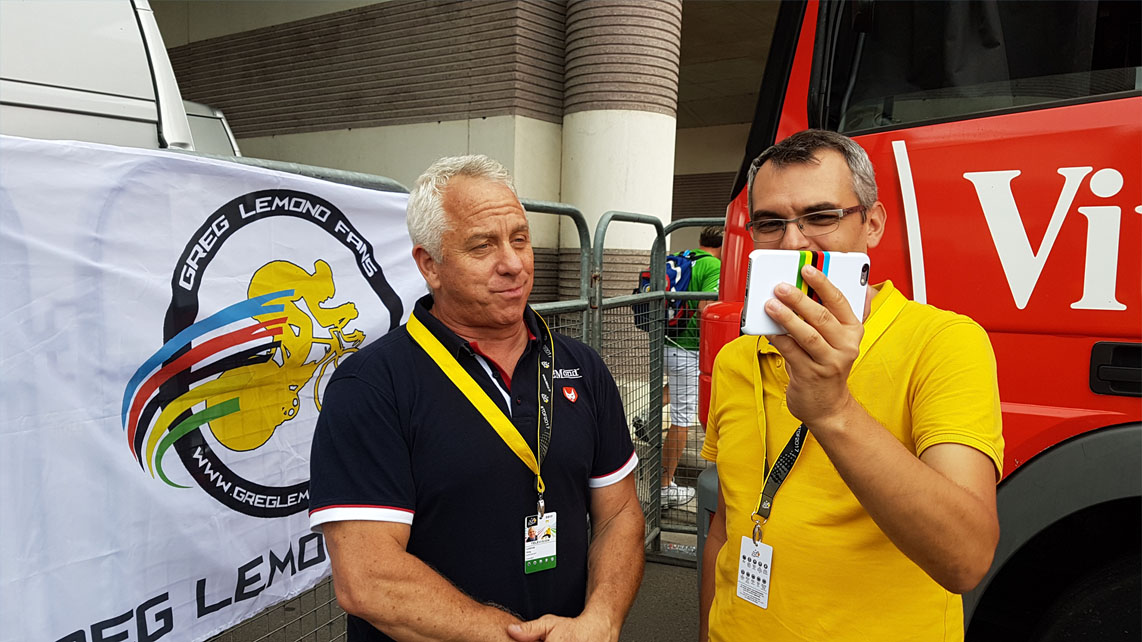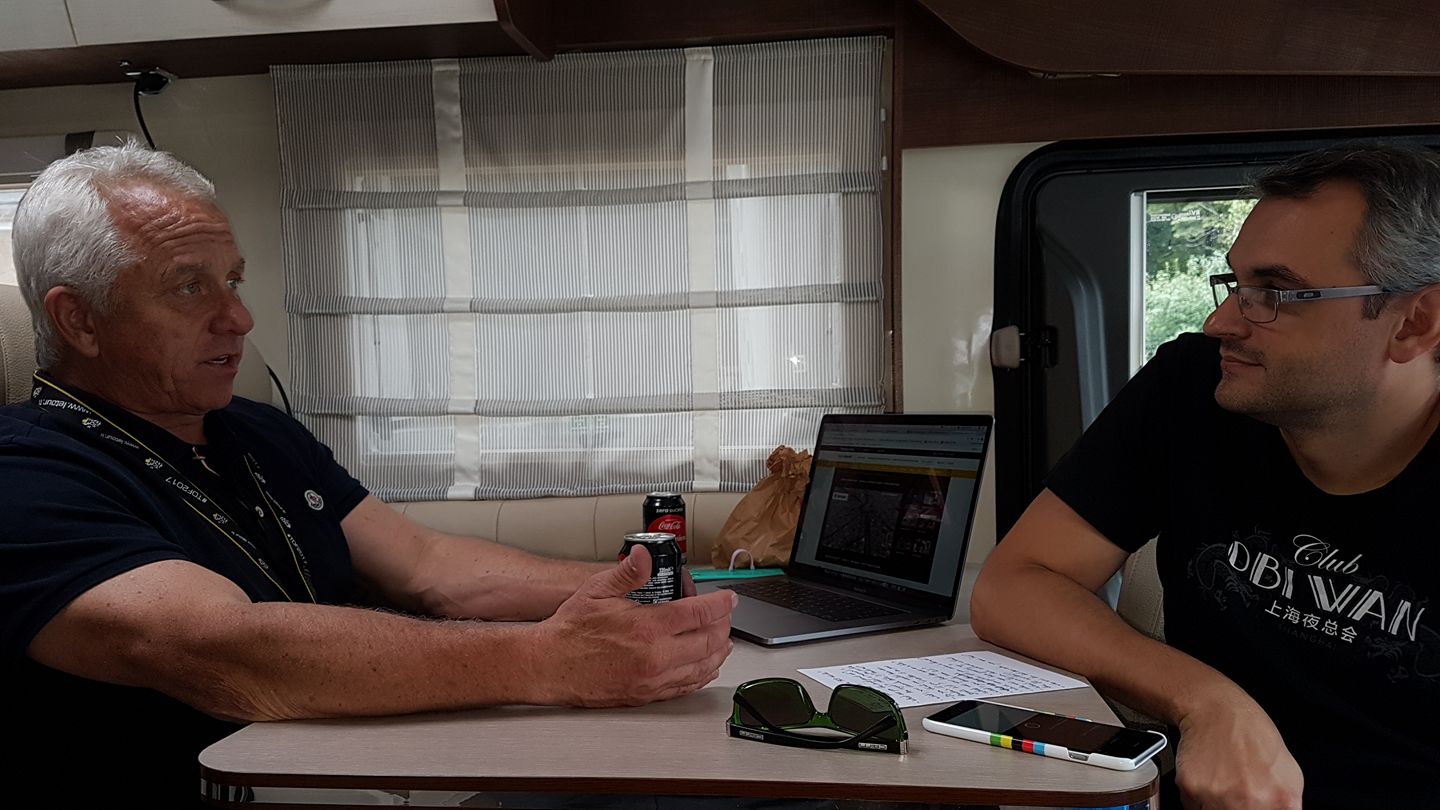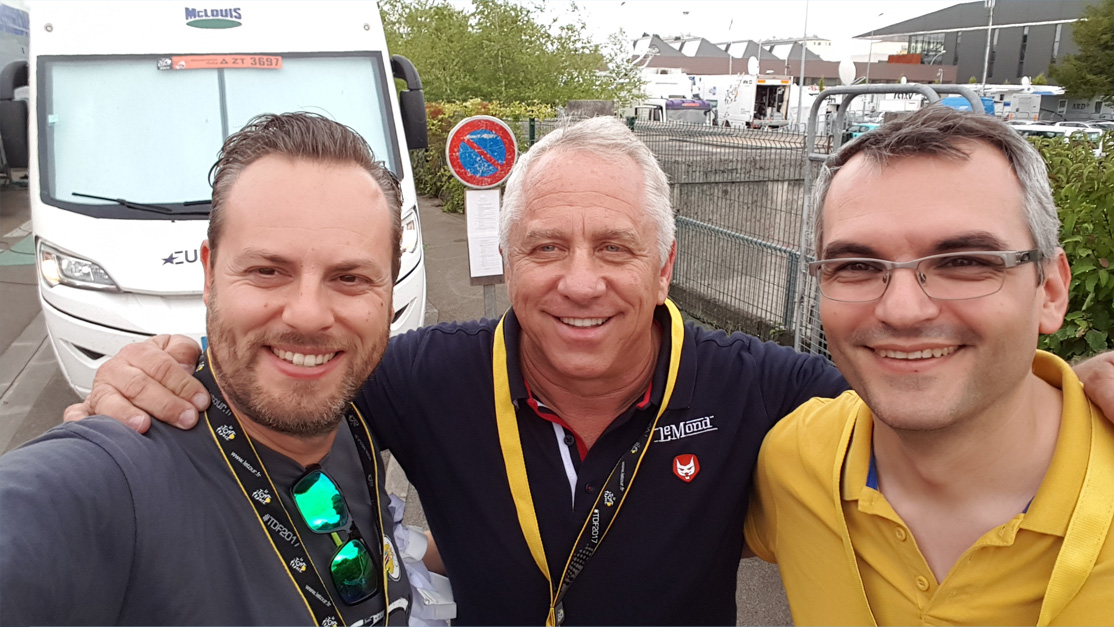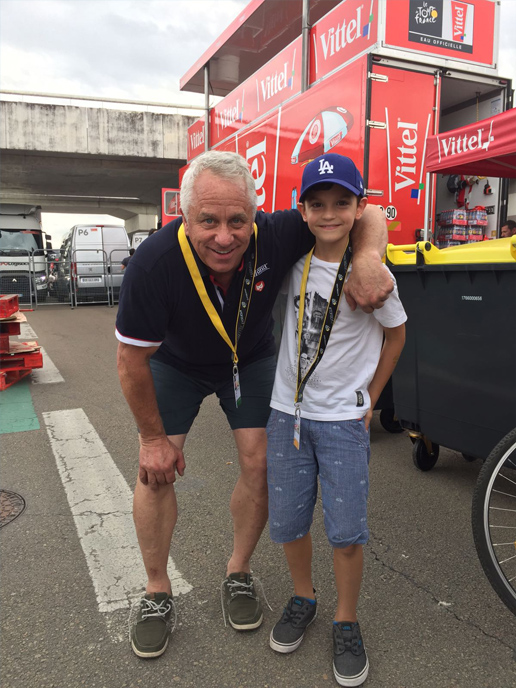 |
Questions for
Greg
Paris
! this is the last stage of the Tour and Thierry and I are here to make
sure we
deliver on our promise : the first ever Greg LeMond interview for Greg
LeMond
Fans forum members. When we saw Greg in Troyes, he announced the event
on the
forum, using a live video on
our
Forum. If it’s not a scoop, we don’t
know what is.
We
are told this is a slow day for Greg and it’ll be easy to proceed with
the
interview. In fact, Greg’s slow days look like a busy day for most of
us. It’s
already getting late in the day when we sit in his trailer for half an
hour.
Our job is to maintain Greg’s focus, as there are sollicitations
everywhere.
Greg is tired but as you’d expect, once he starts to talk it’s hard to
make him
stop.

GLF:
What can you tell us about LeMond
Composites and the future of LeMond bikes?
GL: LeMond Composites is a carbon
composites manufacturing company. We’re gonna make the first low cost
industrial and airspace carbon fiber at 50% lower than the market, or
more. The
goal is to bring carbon fiber to a larger market, for automotive wind
energy,
infrastructures… That’s our primary business, but we’re using the
bicycles to
innovate new ways of manufacturing. It’s a product development. We’re
not real
carbon fiber composite experts. We’re gonna try to innovate
manufacturing
processes for composites, using the bikes. We’ve made prototypes so
far, we’ve
made stems, cranks… I don’t want to talk too much about it, we want to
keep
surprises for our competitors. We’re gonna develop a full line of bikes
and
hopefully we will have bikes by next spring. I would have had a
rideable
prototype bike made by july but we decided not to. The bikes will
hopefully
come out next year but I never want to set a date (lowers his voice)
it’s a secret…
GLF:
It’s still a work in progress.
GL: Yeah! I don’t
want to set a date but
it could be very quick once we have it nailed. Small scale next year,
then ramp
up the next year. Maybe I’ll sponsor a pro team one day when I know
there’s no
motorized doping.
GLF: Do
you have a favorite bike?
GL: (long pause)… 2005 or 2006 Triomphe
carbon fiber bike. It rides as well as any carbon bike today. Next I
would rate
the 1986/87 Della Santa steel bike. I was amazed how nice it rode. It
made me
think about longer wheel base. Wheel base are too short today. That’s
what I’m
gonna experiment, a new geometry with longer wheel base. You don’t need
to have
it longer if you have disc brakes, anyway… My favorite bike when I was
racing?
Honestly, it could be so overrated. I’ve had shitty bikes and I won
races on
them.
GLF:
Name them!
GL: We tried to make them so thin, to
the point that we couldn’t even ride them. If you look at Gitane, they
were all
made by custom manufacturers, nobody had production bikes. They were
all custom
made, they all had the same angles. Obviously the TVT bike was the one
that I
won the Tour with. I like it because it’s light. But whenever there’s
talk
about stiffness… People think stiffness is better but there’s no reason
to have
a harsh bike. The important thing about bike handling is the geometry
and the
way the rider is set up on the bike. You put somebody too far forward,
over the
front wheel, pointing down and a perfectly good bike will feel like
crap. When
I put people on a bike, they all feel immediately balanced, and it’s
still the
same time of positioning I’ve done since the 80’s. I put the saddle up
a little
bit higher.
GLF: You’re on record
for saying a longer
crank length is better for time trialling…
GL:
That’s what Guimard told me…
GLF: …but when you gave us our
bikes you
advised us to take shorter 170 cranks.
GL: Even smaller. They picked 170, 172,
175 out of the air. It’s the same thing with max heart rates. I mean…
Two
cardiologists are sitting on a plane and they say “how do we
standardize heart
rate for people who exercise?” They say 220 minus their age. They just
picked
it out of the air. That’s what the cranks were. There was no science,
there was
no engineering reason. The cranks were that lengths. In the days of…
Coppi,
maybe ? When the gears were restricted, when you went up a steep grade,
longer
cranks gave you more leverage. Now, we know power is force x velocity.
If you
have really long levers, you’re repeating that force at a very slow
rate. This
was the theory back in Guimard’s day. I know now that the cranks were
too long.
Way too long. It’s funny because Paul Koechli kept arguing and I said
he was
wrong but he was right (laughs). “Pushing big gears develops more
power” Guimard
said. It doesn’t. Power is power. There’s a certain amount of force and
a
certain amount of velocity that generates a certain amount of power.
GLF:
Were you always this interested in
technology or is this something you picked up from Guimard?
GL:
I took it all up and I continued to
read and study. People keep asking how much things have
changed since I was
racing. I didn’t stop reading, I didn’t stop thinking about how things
are
made. The more I know, the more I see things were pretty well known
back in the
80’s. We were just as conscious of weight and aerodynamics way back
then. Paul
Koechli calculated 1 kilo is 1 minute and a half up a climb. Right now,
when I’m
designing bikes, I’m trying to think about how to accommodate geometry
and
property for small riders and large riders. Because there’s only a
sweet spot
of bikes, like 53/55/57, that fit people with the right geometry
balance. When
they get
bigger, they try to keep the same wheel base, they just extend steep
and head
tube, relax the
seat tube. So, a really
tall person goes more on the wheels. And it’s the same with smaller
people.
They use too long a crank, they have their toe overlapping.
GLF: You made a very big Washoe
for Adrie
Van Diemen.
GL:
Yeah. We want to make it totally
different than that. Better geometry. It will be the same geometry as
my bike.
If you see small riders and women, with the long
cranks, the thighs go up to their
chest. So, if they have shorter cranks and higher seats, a different
build,
they can ride over relaxed, just like a racer. And the geometry is
better. So,
we’re gonna make crank specific geometry. I think my optimum crank
length when
I was racing would have been 160, 165 maybe. University of Utah showed
the best
crank length for peak power for sprinting is 140. If you’re not losing
power at
140, it means for smaller riders they’d lose nothing. Why would my wife
crank
length be the same as mine ? It makes no sense. So… Smaller riders,
they think
they need a shorter top tube but they don’t. They need to have their
crank
length lower, up the saddle a little bit, so they can relax on the
saddle. I
want to do totally different designs so the sizing is always consistent
all the
way through the line. Ride quality.
GLF:
Did you
have a hero growing up?
GL: (exhales
for 30 seconds)… I saw this guy Wayne Wong. I wanted to ski, so he was
my hero…
Eddy Merckx, Hinault, I respected them but I don’t know if I called
them
heroes.
GLF:
Inspirations, maybe?
GL: Yeah,
maybe. Hinault and Merckx, much more from an athletic perspective.
« That’s what he did, I want to do the same ». If
Eddy Merckx turned
pro at this age, I want to turn pro at this age. If he won the Tour or
was
world champion at this age, I want to do the same. Almost like
milestones. I
did that with Hinault. Because at one point, when I was 15, 16, 17, I
was
winning almost every race in the U.S. Then I went to Europe and I won
every
race I entered. I went to France, I went to Switzerland. I went to
Belgium and
I won 6 out of 8 races. I went to Poland, I won one stage and I went
through a
crash. So I said « Hinault and Merckx started like
me ». I’m riding
as well as anybody that I raced in Europe so why can’t I think of a
career like
Eddy Merckx ? Who knows ? I looked up to Hinault. He came over when I
was 18.
You’re sitting with the man you look up to and all of a sudden he’s
your
teammate. But it was more of a friendship relationship than a hero
type. And
the more I got to know them, you know, they’re not my heroes anymore
(laughs).
Hinault was always pretty good. I don’t know about Merckx but riders
like
Francesco Moser… They were so arrogant. I met Merckx when he was
retired, I
didn’t really know him well.
GLF: Did they
inspire that « goals list » of yours?
GL: Yep. When
I started racing, you have to remember that I didn’t know anything
about
cycling, about the Tour de France. I bought a yellow bike and a yellow
jersey.
One of my first races I lost to a guy named Kent Gordis. He was pissed
at me
for some reason. When he won the race, I broke the ice and he said :
-Greg, you
know what ? Have you heard of the Tour de France ?
-No
-Well, it’s
the biggest race and the only one who wears a yellow jersey is the
winner of
that race.
I’m like
« Oh… Ok ! ». He’s the one who educated me, he’s the
one who invited
me to Europe. He started talking about European riders. Roland Dalla
Santa in
Reno had every magazine about cycling, Miroir du Cyclisme, Bici Sport…
That
kind of got me really into it. People were building up European riders
as
mythical gods. There was a complex.Those guys were so good. My thought
process
was quite mature, in a way, as I was logical : « Ok, they’re
good, so why
can’t I be that good ? ». I was fortunate to have a good
coach, Eddie Borysewicz. He
defected after the 76 olympics. He had a good background in physiology
and he
also knew some world class riders. He recognized that into me and a few
other
riders and we focused on the team time trial. We had a bronze medal at
the
junior worlds in 78. So the goals that I made in 78 were just like my
fantasies
of Europe. I was racing and winning, winning, winning… the bronze
medal… I was
9th at the road worlds with a broken seat… so I knew I was really good,
but I
didn’t really know until I got to Europe, I did beat the best swiss
riders. I
won 2 races in France and then Belgium. I was really competitive. I
figured Bernard
Hinault and Eddy Merckx had to put their pants just like me, one leg at
a time.
I had done it two legs at a time…
GLF: (laughs)
It doesn’t work that well…
GL:
(laughs)
No, You have to do it one leg at a time.
GLF: Did you
crash?
GL:
I crashed
a lot… with my pants.
GLF:
Do you
think you could have won Roubaix if you had written it on the list?
GL: Yes, I
could have won Roubaix, but… I got shot ! Nobody’s ever had a career
like mine,
in cycling. I was at my prime and I got shot. It took 39 years for
Gilbert
Duclos-Lassalle to win Roubaix. Your first 2-3 years, you’re just
figuring out
Paris-Roubaix. On my first year I did 230km with Hinault and did the
final
attack before he attacked, but I was in the front. I raced in Belgium
specifically so that I could learn how to ride the cobblestones. That
was a
goal of mine. But as an American, when you come to Europe, you’re
constantly
getting sick. The first 2-3 years is getting used to the load of racing
an then
weather an then cold. In 83 I did the Vuelta and I got sick, could
barely
finish the race. In 82 I broke my collarbone. In 84 I know I did
Roubaix
because I crashed with Fignon… You need to do it more. In 86 I was
there with
Moser, at one point, right in the front, floating on my bike. I felt so
good, that
year… I win the Tour and then I get shot and I’m not even competitive
in years.
That really fucked up everything.
GLF:
Do you
think you would have been as strong in 87 as you were in 86, if you had
not
been shot?
GL: Oh, yeah!
I was a little down after 86, but I
think that would have gone away once I got
rid of Hinault. I wasn’t looking forward to stay with Toshiba. 87 was not
going
to be my best year but I won the Tour in 1990 and it was not a good
year with
mono, so… If you take Hinault away, I’m sorry for
Roche and Delgado but they
weren’t close. Fignon wasn’t there… I missed really good years.
GLF: Jeff Bernard
was at Toshiba in 1987. How do
you think it would have been with him?
GL: He wasn’t
even in the same class. Jean-François Bernard was a domestique, come on,
no
way! What did he do in the Tour that
year ? He won a time trial…
GLF:
He
finished 3rd.
GL: Not
winning. If you’re good you get 1st or 2nd.
GLF:
You did
3rd on your first Tour.
GL: Yeah, but
I had bronchitis. I mean he raced as a teammate. He was good, but he
wasn’t a
Tour de France winner. Never. If I was there, it would not have been a
question, to me. I would have had to be sick or unhealthy. I raced with
all the
same riders in 89 and 90, those guys didn’t retire. They had a chance
to beat
me in those years. I don’t like to say this, but if you really look at
it,
there’s no rider recovery like mine. I got 35 lead pellets, it was
severe. Even
despite that, Roche and Delgado were there in 89, they were there in
1990. They
were there in 91 and that was the year of EPO, so… 84, 85, 86, those
guys were
there too. We were not in the same class.
GLF:
Which
competitors were in the same class as you?
GL: Fignon and
Hinault.
GLF:
No other?
GL: Not
in the
Tour. Nobody.
GLF:
As for
Classics?
GL: You look
at the Belgians and they’re racing there full time, always in the wind.
That’s
such good training. I was racing with a french team. Renault did those
races.
At La Vie Claire it was a second thought. You need 1 or 2 riders help
you for
the classics. I never had that. After 85, 86, I knew I needed a
teammate to be
there. Imagine every crosswind you go, always battling by yourself. 1
or 2 good
teammates there, at the end of the race, make everything. That’s why
the
Belgian teams were so good. It’s a different mentality. The Classics
are
important to them. I would have loved to have 2-3 riders like Johan
Lammerts. I
wanted to win the Classics. But after I was shot, I was never stable. I
would
come from so low and then train, get there and be tired. Then I’d
recover and
train back up. 85, 86, I was fine all year long. I never was the same
(after
being shot), physically. It was tough, mentally but I could manage. It
was
physically…
GLF:
Who was
your best teammate?
GL: Johan
Lammerts.
GLF:
Why?
GL: He was a
good friend. He helped me, kept me in races. Good teammates are good
friends
that keep you going. « You’re gonna be ok ». Steve
Bauer and Andy
Hampsten were good teammates at times… but in 85, 86 we had a different
style
of racing. We raced how good we were that day. I was a leader one race,
then
someone else was the leader. 85, 86, I didn’t have a dedicated
teammate. 89, 90
were the first teams where I had a dedicated teammate… But I only got
one good
year with them! (laughs). I was partly a teammate from 81 through 84.
In races
like Tour de l’Avenir or Dauphiné I was able to be a leader. 84 I
really wanted
to go and win the Tour, but I got sick and got bronchitis for 3 days.
Who knows
what I would have done because Fignon was super that year.
GLF:
He was
flying.
GL: He was. I
don’t know how I would have done. It’s interesting because the year
before
(1983) I ought to do it but it wasn’t in the plan so I didn’t do it. I
raced
against Hinault, Fignon… All 3, we were really top level riders and that’s a
big difference to be racing with such riders. 1990 was easy. It was
nothing.
Hierarchy is hierarchy. You race for years and you know who are your
competitors. That’s why it got so confusing in the early 90’s because
the guys
that are still racing with you, all of sudden, they’re beating you. And
you go
« I don’t understand it ». But I didn’t look too much
at everyone
else, I looked at me. I was so used to struggling, if I wasn’t feeling
good,
then I wasn’t feeling good. Because I was never feeling good (laughs).
That’s
the problem. I didn’t feel good… I was glad I raced when I did. Sport
had
doping issues before, but I think I came in in a very innocent period.
I don’t
know what everybody was taking, but we were tested for amphetamines and
cortisone. All I know is that I beat people. There were no miracle
drugs at the
time, I don’t believe. Maybe I’m naive. I saw Andy Hampsten win the
Giro, the
Tour of Switzerland. Hampsten, Bauer, swiss riders… I know they were
clean. So,
you were capable of doing it. It started changing in the late 80’s.
Moser,
Ferrari, they’re the ones who started bringing in organized doping. I’m
glad I
competed when I did. I’m glad I won the races that I did. There was a
lot more
doping in the late 80’s. A lot more. I’ve heard stuff that happened
since and
all I can think is « man, I was lucky ». I was lucky.
They might as
well had EPO in 85. We think EPO was up in 86, 87, 88. It was Ferrari.
That’s a
rumor.
GLF:
Roberto
Visentini was only good in Italy never came to the Tour, or maybe just
once.
GL: I
hear
stories about the Tour and I go: how did I win? Felix Levitan was the
controller of the Tour. He was there in 86 when Hinault and I were
going at it.
If he had not warned me, I would probably have turned out positive. I
protected
myself, cleaned up the vials… So, when I look back I can say that I did
it on
my own. I wasn’t forced to do anything that I didn’t want to do. That’s
a big
luxury. Most riders after 90 didn’t have that choice. They had no
option : you
want to race ? That’s what you do. If not, you’re out. I’m glad I
didn’t have
to face that. It would have been horrible. Imagine you just fall in
love with
the sport, you’re really good and all of a sudden… From an American
perspective, there’s no history of the sport. You have to fly over here
(in
Europe) and see what you have to do. I remember the one American rider
I had as
a teammate in 81. His wife said « Greg’s gonna have to start
taking
drugs ». My wife was like « what ? No, he’s a pro,
he’ll never do
that! ». Then (the wife of the American rider) started
screaming
« You’re so naive! ». That’s the mentality.
 GLF:
You said
Guimard was the best coach you’ve ever had. What made him the best
coach ? GLF:
You said
Guimard was the best coach you’ve ever had. What made him the best
coach ?
GL: He looked
at every rider as individual. He knew that I was not from France, he
knew that
I needed to go home and have my wife around. He didn’t force me to do
anything
else because he knew I’d rebuild anyway. He learned that very quickly.
He was
really good at giving riders strategy in the race, positioning… He was
savvy in
racing tactics but he was also good because some people shame :
« you’re
not trying, you got to try harder ». He never said that. He
was more like
« what’s going on ? How do you feel
? Don’t worry, you’re gonna feel better ». That’s how Guimard
would do.
When I was waking up before the worlds in 83, I was so nervous. I knew
I could
win, I was riding so well and the world championship was my goal, that
year. I
could not eat, I couldn’t sleep. I had breakfast at 5, but I threw it
up, so I
had nothing to eat before I went to the race. So here I was
« I've had no
sleep, I’m not gonna do well… ». Guimard put his hand on my
shoulder and
he said (pulls out his best french accent): « Greg, tous les
grands
exploits sont faits sans dormir, parce que tu sais bien ce que tu peux
faire ».
And I went « Ah ? d’accord, je ne suis plus
fatigué! ». Good coaches
are psychologists too. Athletes are fragile at 22. It’s a stressful
sport. You
got to bring the riders up to where they can build confidence. I was
very
fortunate getting to race in America because I won right away and that
feeds
excitement. You think you’re really good. Now, if I had turned pro in
Belgium
and I wasn’t ready, i would have been dropped and ending up discouraged.
...and,
with this, our interview is cut short. Froome and all the 2017 Tour de
France
peloton are closing in on the Champs Elysées and Greg has to watch the
race in
order to share his thoughts on Eurosport later. Are you as frustrated
as we are
? Then we have a little bonus for you. When we saw Greg in Troyes,
earlier in
the Tour, my 9 year old son Gabriel asked for an interview with him, as
he’s
really getting into cycling. Before Troyes I showed Gabriel what the
85, 86 and
89 Tours were like. And he was curious about how things turned out. So
here’s
what Greg had to say to a 9 year old boy who dreams of riding the Tour
one day…
(we spoke french during that discussion).
Gabriel
: The ADR team wasn’t really
strong. Why did you go ride with them?
Greg
: Because I had no team. In 87, I had a hunting accident and no team
wanted me.
The only one was PDM, a Dutch team but they got into trouble later that
year
and I left them. I asked my friend Johan Lammerts, who was at ADR, if
they had
a spot for me. They made room for me. It was good because because they
had a
good coach, José de Cauwer. And it was a rather good team, for the
Classics.
They weren’t as strong for the Tour. They did their best, though. There
were
good vibes within the team. But there was no money. they had promised
lots of
money to riders but they never paid.
Gabriel : was it hard to beat
Fignon in
89?
Greg
: Oh, yeah. Very hard. He was in very good shape, in a better shape
than I was
in. We had a good fight. One day I’d take the yellow jersey, then he’d
take it,
then i’d take it back… Eventually I took it for good. That was hard. He
was a
good rider. I
suffered a lot.
Nicolas (to Gabriel) : Did you
think he
could win?
Gabriel : Yes,
because he had taken 56
seconds to Fignon in Rennes, so I thought it was possible but I wasn’t
sure.
Because it was a shorter distance.
Greg
: Yes, you’re right. But I figured, since I had the tri bars… 6 weeks
before,
at the Giro, we did a 51km time trial and I beat Fignon with the same
kind of
bike than he had. 1 minute 21 seconds. So, I did the maths, that I
could take
40 seconds this time. But I was in a better shape than in Italia, so I
calculated that I could end up as close as 3-4 seconds. With the bars,
it made
things possible. I was the only one thinking I could do it. No, wait,
there was
another one. They asked 20 persons in “L’Equipe” if they thought it was
possible and one of them said he believed it was. So that was him and
myself.
You have to believe that you can do it. Fignon and I shared the same
coach for
a while, Cyrille Guimard. He used to say “it’s never over until you
cross the
finish line”. The day before the ITT, Fignon came and put his hand on
my
shoulder to congratulate me on my 2nd place. That’s where I thought
“You guys
just lost the Tour”. Fignon thought he’d already won, but there was one
day
left. I think he started his ITT far too relaxed. I took 20 seconds off
him in
the first 10km. knew I had to warm up
really well to start at the fastest pace right away. It’s a good thing
to know,
that you have to keep going until you reach your goal, unless your
personal
health is on the line.
Nicolas : browsing through pictures of
the 1989 Tour prologue, we can see you didn’t use the bars that day but
there
are marks on the bars that show you’ve already tested the tri bars.
Greg
: It was short, I wasn’t sure it would make a difference there. I also
wanted
to keep it a secret, in case I did well later on. I wasn’t comfortable
with the
tri bars yet. Prologue had turns right and left, it’s only for the
first ITT
that I tested it for real.
Thierry :
José de Cauwer also said you
glued Mavic stickers on it so that people would ask them to provide,
but it was
Scott?
Greg
: It was (laughs).
Gabriel : Was
Bernard Hinault your friend?
Greg
: Yes. A little less by the end of our last Tour together. He was more
of a big
brother to me. We were friends, we respected each other. During his
last
season, he was under the influence of our boss Bernard Tapie. Hinault
is a good
guy, in my opinion.
Nicolas : We
watched the 86 Tour videos
and when you finally take the yellow jersey in Serre-Chevalier, Gabriel
said
“but Hinault didn’t help him, in fact ?!? He won on his own !”
Greg
: Not really. He pulled a few stupid tactical tricks that helped me,
though. It
would have been better if he had worked for me. It was much easier to
win with
the Z team and Jérôme Simon (Jérôme Simon is seated with us during the
interview). I had riders protecting me. I didn’t have that at La Vie
Claire.
Even Hampsten and Bauer raced for
themselves, at times. It was really
individual.
Gabriel : Did
you want to win
Paris-Roubaix?
Greg
: Oh, yeah. After my first Tour win I broke my hand, went back home. My
brother
in law shot me with a rifle, by accident. I was never really
good after that. I
never was in really good shape. by accident. I was never really
good after that. I
never was in really good shape.
Nicolas
: You liked Paris-Roubaix.
Greg
: I love it. I was 9th in 92, I could have done even better, that day.
But
Duclos had saved my Tour in 1990, during the Pau stage. I wanted to work for
him, it was a good compensation.
Nicolas : That was the peak of Duclos’s
career, Roubaix was his whole life.
Thierry
: You were there when he won
the following year. You had a puncture in the forest.
Greg
: You know that better than I do I need you for my memory (laughs).
Nicolas : What advice would you give
to
a 9 year old who wants to become a pro cyclist?
Greg
: (Looks at Gabriel) At your age, you have to do short efforts and
different
types of riding ; BMX, mountain bike… Any kind of bike. CX and track
too. But
only for short periods of time. Just for fun.
Nicolas :
Short distances. We’ve
already done 30km and he’s always asking for more !
Greg
: (laughs) Save your energy for when you’re 14 or 15. If you enjoy it,
it’s
fine, but it’s better to keep under under one hour. And use a
small gear to
turn the leds like this (gestures a fast pace). I’m gonna make bikes
for short
people with the correct angles. Shorter cranks, so you’ll be ok. Very
light
too. (I show Greg a picture of Gabriel riding a Giant TCR for kids)
That’s a
nice bike. (looks at Gabriel) Is that you ? That’s what I want to do.
Is it
carbon ?
Nicolas :
Aluminium.
Greg
: It’s really good. Mine will be carbon, cranks and bars included.
It’ll be
affordable.
Nicolas
: (to Gabriel) Do you want a
carbon LeMond bike ? (He shows a big smile).
Greg
: I thought maybe our first bike would be this, a kid’s bike. I want to
make
MB, BMX and road bikes for short people. How much do you weight ?
Gabriel
: 27kg.
Greg
: Imagine if your bike is 15kg ! It’s too heavy. I want top quality,
lighter
than aluminium. 140 cranks. It’ll be really custom. Biomechanics,
geometry… I
want to offer something different for brakes too.
Nicolas
: His bike has brakes and
shifters designed for adults. It’s really hard for him. Fortunately he
has CX
brakes too.
Gabriel
: I can’t reach the big
chainring.
Greg
: Disc brakes have a shorter course. Some mountain bikes change both
front and
rear with one switch, but electronics are expensive. Any other
questions?
Gabriel : No,
we’re done.
Greg
: Very good, that was a good interview.
Gabriel : Thank
you.
We
end the interview. Gabriel shows Greg his vintage Renault kids jersey
and cap
and Greg signs them. He has a new fan for life.
Since
Jérôme Simon is with us in Troyes, we ask him what was Greg like, as
team
leader. Here’s his answer:
Jérôme
Simon : Greg was different. Until he came to Z I had had Roche as a
leader for
La Redoute and he was very different. Greg didn’t ask for us to race
for him at
every single race. Sometimes we could race for ourselves. He would even
help
us. Greg helped me win the Tour d’Armor. And he was thankful for the
job we’d
do. Always appreciative. That’s the kind of leader he was.
|






